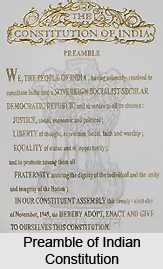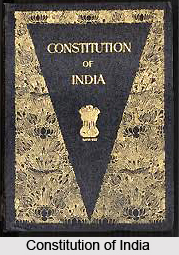 The Preamble of Indian Constitution reflects the basic structure and the spirit of the Constitution. It is regarded that the preamble serves as a channelising tool for the interpretation of the Constitution as a whole. The preamble acts as the preface of the constitution of India and lays down the fundamental value and philosophical ideas. It represents the entire Constitution in its written words. It contains the basic features of the Constitution and thus considered to be a vital part. The preamble is significant because it highlights the type of society and government it wishes to establish. However, the preamble does not contain laws enforceable in a court but, no law can be enacted or amended in a manner that violates the spirit of the preamble. Thus the preamble of the constitution of India is unamendable or unalterable.
The Preamble of Indian Constitution reflects the basic structure and the spirit of the Constitution. It is regarded that the preamble serves as a channelising tool for the interpretation of the Constitution as a whole. The preamble acts as the preface of the constitution of India and lays down the fundamental value and philosophical ideas. It represents the entire Constitution in its written words. It contains the basic features of the Constitution and thus considered to be a vital part. The preamble is significant because it highlights the type of society and government it wishes to establish. However, the preamble does not contain laws enforceable in a court but, no law can be enacted or amended in a manner that violates the spirit of the preamble. Thus the preamble of the constitution of India is unamendable or unalterable.
The Preamble of Indian Constitution states:
"WE, THE PEOPLE OF INDIA, having solemnly resolved to constitute India into a SOVEREIGN SOCIALIST SECULAR DEMOCRATIC REPUBLIC and to secure to all its citizens:
•JUSTICE, social, economic and political;
•LIBERTY of thought, expression, belief, faith and worship;
•EQUALITY of status and of opportunity;and to promote among them all
•FRATERNITY assuring the dignity of the individual and the unity and integrity of the Nation;
•IN OUR CONSTITUTE ASSEMBLY this twenty-sixth day of November, 1949, do HERE BY ADOPT, ENACT AND GIVE TO OURSELVES THIS CONSTITUTION"

The preamble was adopted with the constitution in the constituent assembly. It came into effect in 1950 along with the constitution. The original draft of the constitution opened with the words `Sovereign Democratic Republic` in the first line. The words `Socialist and Secular` were inserted by the 42nd amendment. The same amendment contributed to the changes of the words unity of the nation into unity and integrity of the nation. The significance of the Preamble of Indian Constitution lies in the "We, the people". These words emphasizes that the ultimately powers are vested in the hands of the people of India. The expressions state that the constitution is made by and made for the people of India. In addition to that, the Preamble also lays down the essential national goals for every citizen justice, liberty, equality, and fraternity.
According to the Preamble of Indian Constitution, the word `Sovereign` occupies a vital role in the country. It means supreme or independent and embodies India is internally and externally sovereign and is free from the control of any foreign power. Furthermore, the country has a free government which is directly elected by the people and makes laws that govern the people. The word `Socialist` also has significance as it implies social and economic equality. The word was added by the 42nd amendment act of 1976 during the Emergency. In addition to that Social equality identifies the absence of discrimination on the grounds only of caste, colour, creed, sex, religion, or language. Besides, social equality has equal status and opportunities. The preamble also guarantees secularism. The word `Secular` was also inserted into the Preamble by the 42nd amendment act of 1976, during The Emergency. Secularism, implies equality of all religions and religious tolerance and does not identify any official state religion.
Preamble of Indian Constitution is also puts forth the terms, Democratic and Republic. India follows a democratic form of government. The people of India elect their governments at all levels such as Union, State and local by a system of universal adult franchise. India is also a Republic, in a country where the head of state is elected, directly or indirectly, for a fixed tenure. The President of India is the titular head of the state. Thus, the Preamble plays pivotal role and serves two purpose including and indicate to the source from which the Constitution derives its authority and stating the objects, which the Constitution seeks to establish and promote.




















